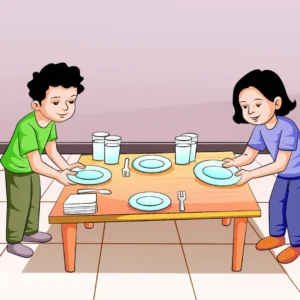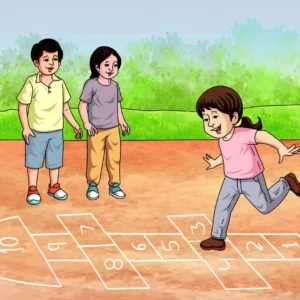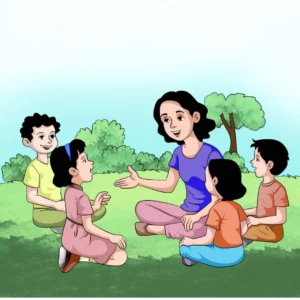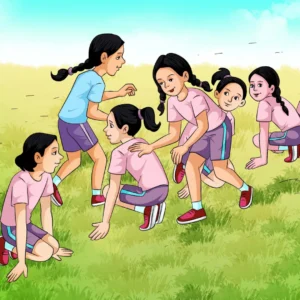40 Healthy Habits for Kids: A Guide to Raising Happy, Resilient Children
- Parents
- May 2, 2025
- Viva Education

Imagine a tiny seed, nurtured with sunlight, water, and love, that grows strong and vibrant. Children are just the same. The healthy habits we establish early, such as brushing teeth and being physically active, become the foundation for lifelong well-being.
As a guardian, you are the primary gardeners in this critical development stage. You have the incredible power to introduce routines, model positive behaviours, and empower the young minds to make wise choices that will resonate for years.
So, let’s explore the essential healthy habits for kids that will help us nurture these precious little saplings into thriving individuals.
Why Are Healthy Habits Important for Kids?
Healthy habits play a significant role in a child’s overall development. They help kids grow strong, support brain development, and keep their immune systems working well. When children eat balanced meals, stay active, and get enough sleep, they can better manage their emotions and stay focused. Simple routines like brushing your teeth, washing your hands, and sticking to a schedule teach responsibility and build essential life skills, such as independence and time management. These everyday habits lay the groundwork for success not just in school, but in all areas of life, now and in the future.
Understanding the Essential Good Habits for Kids
We’ve meticulously compiled all the essential good habits for kids in one place, covering everything from personal hygiene to emotional well-being, so you can confidently guide your child toward a healthier and happier future.
Personal Hygiene & Health
Personal Hygiene & Health: The Foundation of Well-being
1. Brushing Teeth Twice a Day
Start the day fresh and end it clean! Brushing in the morning helps fight bad breath, and brushing at night removes food bits that can cause cavities.
Tip: Use a fun song or set a 2-minute timer to make brushing more enjoyable. Involve your child by letting them choose their toothbrush, maybe even a cartoon-themed one!

2. Washing Hands Regularly
Germs are invisible, but their impact isn’t. Washing hands before meals and after play, using soap and water, helps stop the spread of illness.
Fun Fact: Proper hand washing can reduce diarrhoeal disease by up to 40%, a significant concern in India!

3. Bathing Daily
A daily bath keeps the body clean and mind fresh, especially in warm climates. It’s also an excellent time for kids to learn independence and body awareness.
Tip: Add a splash of fun with bath toys or bubbles for younger kids.

4. Keeping Nails Trimmed
Long nails can trap dirt and germs that cause stomach infections. Trimming nails should be a weekly routine, like every Sunday evening.
5. Using tissues/handkerchiefs for sneezing or coughing
When we sneeze, germs can travel up to 8 metres through the air! Covering up helps prevent the spread of colds, flu, and other infections, particularly in schools and crowded places.
Tip: Encourage the habit of “Catch it, Bin it, Wash it”. Catch the sneeze, throw away the tissue, and wash your hands.

6. Maintaining Clean Living Spaces
Involving children in tidying up their toys or make their beds builds hygiene and responsibility.
Bonus Tip: Create a “10-minute tidy” game. Set a timer and clean together!
Nutrition & Eating Habits
Good food = good mood! Nutrition is the foundation of a child’s physical growth, mental focus, and emotional well-being. Let’s build healthy habits for kids that nourish their bodies and minds. Avoid high-fat fried foods and burgers from restaurants, especially fast food joints.
7. Eating a Balanced Diet
A healthy plate should include fruits, vegetables, whole grains, and protein sources like dals, paneer, eggs, or pulses.
Add colour to their tiffins with carrots, spinach, roti, and fruit, making a vibrant combination.
Fun Fact: Kids who eat more veggies tend to do better in school!

8. Drinking Plenty of Water
Hydration keeps kids alert and energised, especially in India’s hot weather.
Tip: Avoid sugary drinks, such as packaged juices and sodas. Instead, offer nimbu paani, coconut water, or plain water with a slice of fruit for a refreshing treat.

9. Practising Table Manners
Eating is also a social skill! Encourage children to chew with their mouths closed, wait their turn, and say “please” and “thank you.”
Tip: Family meals are great for bonding and modelling polite behavior.

10. Limiting Junk Food & Snacks
Occasional treats are fine, but too many chips, biscuits, or sugary snacks can affect health and behaviour.
Smart Swap: Replace fried snacks with roasted makhana, dry fruits, or homemade chikki.
Physical Activity
Children who are physically active for at least 60 minutes daily have better concentration, memory, and school performance. Regular movement reduces the risk of childhood obesity, which is rising rapidly in India. Over 12.5 million children in India are classified as obese (WHO, 2022).
11. Playing Outdoors Daily (1–1.5 hours)
Fresh air, sunshine (a great source of Vitamin D), and open space give kids the freedom to run, jump, and explore.

12. Exercising Regularly (Sports, Yoga, Dance)
Whether it’s cricket in the park, yoga with a parent, or dancing to Bollywood beats, regular movement builds strong bones, a healthy heart, and emotional balance.
Did You Know? Yoga improves flexibility and focus, and it is ideal for both body and mind!
13. Taking Family Walks
Even a 20-minute evening walk after dinner can promote digestion and give families time to connect.
Tip: Turn it into a “spot the animal” or “count the trees” game for little ones.
14. Reducing Screen Time
Too much screen time can lead to poor sleep, eye strain, and less social interaction. Set screen limits and encourage play instead.
Idea: Create a “No-Screen Hour” for physical play, reading, or helping in the kitchen in the evening.
15. Stretching or Moving During Study Breaks
Sitting for long hours can make kids restless and tired. Short bursts of movement, like jumping jacks or toe touches, refresh the brain and improve focus.
Tip: Between study sessions, use music or a “movement jar” with quick activity prompts (e.g., “Hop like a bunny!”).
Sleep & Routine
Children need enough sleep to thrive, just like their bodies need food to grow. During deep sleep, the body releases growth hormone, crucial for physical growth and development. Lack of sleep can weaken the immune system. Research suggests that sleep-deprived children are three times more likely to catch a cold. Ensuring good sleep hygiene is one of the most essential healthy habits for kids to maintain overall health.
16. Getting Proper Sleep
Children need 8 to 10 hours of sleep to stay active, alert, and cheerful. Without enough rest, they may feel cranky, struggle to concentrate, or fall sick more often.

17. Following a Consistent Bedtime
A fixed bedtime helps the body know it’s time to wind down. Bath, brushing teeth, a bedtime story, or a lullaby create a comforting signal to sleep.
Tip: Dim the lights and reduce noise 30 minutes before bedtime to set a calm mood.

18. Waking Up Early
As the saying goes, “Early to bed and early to rise…” helps build discipline and makes mornings stress-free, especially during school days.
Fun Tip: Let kids wake up to a favourite song or a gentle alarm with birdsong or mantras.
19. Avoiding Screens Before Bed
Televisions, mobile phones, and tablets emit blue light that tricks the brain into staying awake by blocking the sleep hormone melatonin. This delays sleep and affects its quality. Encourage screen-free time at least an hour before bed for better rest.
Better Alternative: Swap screens for bedtime stories, light stretching, or calming music.
Mental & Emotional Well-being
A healthy mind is just as important as a healthy body. Helping children understand, express, and manage their emotions helps build confidence, resilience, and inner strength—qualities that last a lifetime.
20. Expressing Feelings Openly
Encourage kids to talk about feeling happy, sad, angry, or scared. When they name their feelings, they learn to handle them.
Tip: Use storytime or drawing to help children express emotions. Puppet play works wonders with younger kids!

21. Practicing Gratitude
Saying “thank you” and noticing the good in life builds contentment and kindness.
Cultural Touch: During daily prayer or before bedtime, ask kids to name three things they’re thankful for, such as family, food, or playtime. This simple habit nurtures a positive mindset.

22. Staying Positive
Teach children to use kind, strong words about themselves, such as “I can do it” or “I’m a good friend.”
Fun Activity: Create a “positivity jar” where kids add daily affirmations or happy moments they experienced.
23. Managing Stress
Yes, kids feel stress from exams, peer pressure, or too much screen time! Simple techniques like deep breathing, yoga, or quiet time help calm the mind.
Tip: Introduce short guided meditations with music or chants like ” Om” for a few minutes daily.
24. Celebrating Small Achievements
Whether tying shoelaces or finishing homework, celebrating small wins builds self-esteem.
Idea: Create a “Wall of Wow!” at home or in class where kids can post drawings, stars, or stickers for things they’re proud of.
Social & Communication Skills
Social skills help children build friendships, express themselves, and become kind, confident individuals. These habits start at home and blossom through daily interactions.
25. Spending Quality Time with Family
Shared meals, bedtime chats, and weekend activities help children feel secure and loved.
Tip: Try a “no screens during meals’ rule and share stories, family tales, folktales, or funny memories from your childhood!

26. Playing and interacting with Friends
Play is a child’s first classroom for communication. Games teach teamwork, patience, and empathy, essential aspects of good habits for kids that promote social skills.
Idea: Encourage outdoor games like kho-kho, hide-and-seek, or cricket, which are rich in culture and teamwork.

27. Sharing with Others (“Sharing is Caring)
When children learn to share, they develop essential social skills, such as cooperation, gratitude, and perspective-taking. Building empathy is a great way to connect, whether through toys, snacks, or sharing ideas.
Practice Tip: Let kids pack an extra fruit or treat in their tiffin to share at school.

28. Using Polite Words (“Sorry”, “Please”, “Excuse Me”)
Good manners are timeless. Polite words help children express needs respectfully and resolve conflicts peacefully.
Fun Idea: Use reward charts for kind words, or create a “magic words” treasure hunt!
Academic & Study Habits
Strong study habits aren’t just about marks; they build discipline, curiosity, and a love for learning. When introduced early, these habits help children stay organised, reduce stress, and develop confidence in their abilities.
29. Reading Daily (Books, Stories)
Did you know? Reading just 20 minutes daily exposes children to over 1.8 million words annually, vastly expanding their vocabulary and expressive abilities. In contrast, students who read only five minutes daily encounter about 282,000 words per school year.
Along with vocabulary, kids exposed to different stories develop better problem-solving skills by understanding diverse viewpoints.
Tip: Encourage reading storybooks in English and regional languages, Amar Chitra Katha comics, or even newspaper headlines for older kids.

30. Studying 1–2 hours a day
A consistent study routine helps build cognitive endurance and improves memory retention. It allows children to absorb information better, reduces exam stress, and encourages a disciplined approach to learning.
Tip: Create a simple “study and play” timetable so kids learn to balance their time and stay structured.

31. Asking Questions When Unsure
Curiosity drives deeper understanding.
Advice for Parents/Teachers: Create a judgment-free space where “silly questions” are welcome.
Responsibility & Life Skills
Teaching responsibility from a young age helps children grow into independent, respectful, and capable individuals. These habits build confidence, discipline, and empathy, which serve them for life.
32. Helping with Household Chores (Age-Appropriate)
Simple tasks like folding clothes, watering plants, or setting the table teach kids the value of teamwork and effort.
Tip: Turn chores into a game! Try a “Chore Chart” with stickers as rewards.

33. Managing Pocket Money and Savings
Giving a small weekly allowance teaches budgeting and the joy of saving for something special.
Fun Idea: Introduce a gullak (piggy bank) to track savings visually – traditional yet timeless!
34. Being Punctual
Being on time for school, classes, or even meals teaches respect for others’ time and helps build a disciplined routine.
Tip: Use a colourful wall calendar or alarm clock to involve children in managing their schedules.
35. Taking Responsibility for Mistakes
It’s okay to make mistakes. What matters is owning up and learning from them. Encourage open conversations without scolding. This builds honesty and emotional maturity.
36. Respect Public Property
Teach children not to litter, scribble on walls, or damage public places.
Cultural Connect: Remind them that “Swachh Bharat starts with me!” and lead by example.
37. Caring for Pets and Animals
Feeding a pet, refilling water, or caring for street animals fosters empathy and responsibility.
Tip: Even small acts, like putting out water for birds in the summer (a common practice in India), can help build kindness.
Safety Habits
A child who feels safe is not just protected; they’re more open to learning, growing, and thriving. Children taught safety habits from a young age are likelier to stay calm and act wisely in unfamiliar or risky situations. Knowing what to do and whom to turn to also helps reduce anxiety.
38. Following Road Safety Rules
Roads can be chaotic, so teaching children basic traffic rules is essential.
- Always walk on the footpath.
- Cross only at zebra crossings and when the signal shows green for pedestrians.
- Hold an adult’s hand while crossing
- Never run across the road or play near traffic.
Fun Tip: Turn road safety into a game spot for traffic signs or signal colours during car rides!

39. Body Autonomy & Safety
Every child needs to know the difference between safe and unsafe touch. Teach them it’s okay to say “No” loudly, run away, and tell a trusted adult if someone makes them uncomfortable.
Empowerment Tip: Use storybooks or child-friendly videos to explain this sensitively and non-frighteningly.
40. Staying Away from Hazards
Children must learn to recognise and avoid dangerous objects and situations. Teach them to avoid fire, hot stoves, electrical sockets, and sharp tools like knives or scissors unless supervised by an adult.
Safety Tip: Create a “no-touch” zone at home for hazardous items, praise children for asking before handling unfamiliar objects, and encourage them to alert an adult if they notice something dangerous.
Key Takeaways
- Model Good Habits
Children are natural imitators. When they see you brushing regularly, washing your hands, or tidying up, they’re more likely to do the same. - Make it Fun
Turn routines into games by setting a timer for a “2-minute tooth race” or creating a reward chart for weekly hygiene goals. Learning sticks better when it’s playful! - Be Consistent
Daily repetition builds strong habits. Stick to regular bath times, bedtime routines, and hygiene check-ins even on weekends. - Think Holistically
A healthy child isn’t just clean but also emotionally and socially well. Encouraging good habits for kids, such as open conversations, outdoor play, connection, and hygiene, supports overall well-being.
Cultivating Lifelong Wellness
We nurture children through these essential habits and give them the foundation for a healthy, balanced, and confident life. As parents, teachers, and caregivers, your role in this journey is invaluable. By leading by example, making routines fun, and ensuring consistency, you can empower children to follow habits and understand their importance.
To further guide you on this journey of nurturing wellness, we introduce Wellness Wonders, a resource from Viva Education. This book offers engaging, age-appropriate lessons, activities, and tips that help children interactively embrace physical, emotional, and social health.
Together, let’s grow a generation that is healthy, confident, and ready to take on the world!
Frequently Asked Questions:
1. What are some screen-free activities that promote healthy habits for kids?
Simple, easy-to-do activities like skipping rope, playing carrom, drawing, or building with blocks are excellent ways to promote well-being and healthy development for children, especially in a typical home setting.
2. How can I introduce mindfulness to my child’s daily routine?
Simple breathing exercises, nature walks, or short guided meditations can gently build mindfulness into a child’s routine, supporting emotional development and reducing stress.
3. When should kids start learning about nutrition and food choices?
Children as young as 3–4 can start learning healthy eating habits by helping with simple tasks, such as washing vegetables or identifying the colours of fruits, which builds early awareness of good nutrition.
4. How do I create a balanced digital routine for kids without conflicts?
Set clear screen-time rules, offer attractive offline alternatives, and involve children in making the schedule. This helps establish a digital balance and encourages responsibility.
5. Can healthy habits help improve a child’s learning and academic performance?
Yes! Consistent sleep, nutritious meals, physical activity, and emotional wellness directly boost concentration, memory, and academic success in growing children.
>> Please Share



